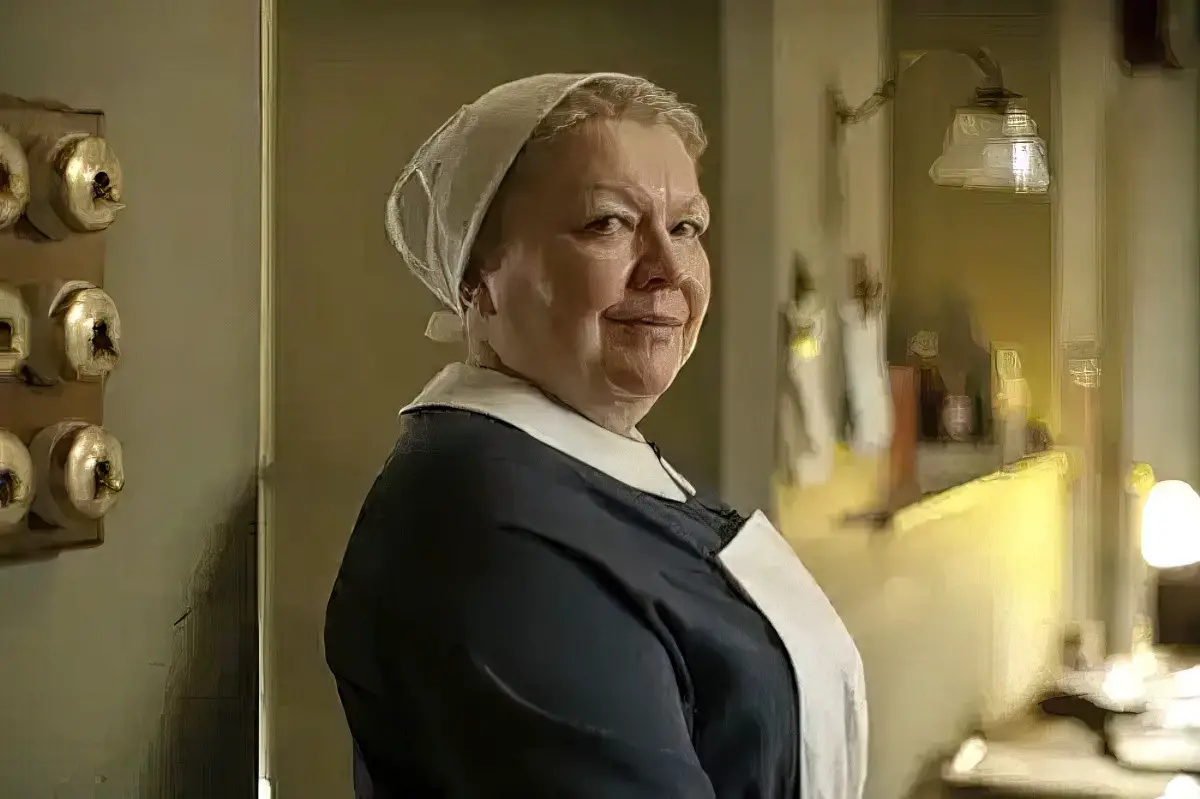The idea of a strange, perhaps untrustworthy housemaid is particularly discomfiting to a middle class who can afford such luxury; we hate to think that we invite our own evil into our comfortable homes. An untrustworthy woman let into the home is a familiar trope in horror stories, and is the basis of Mavis Gallant’s short story “Bernadette”.


Sometimes the trope isn’t used in the horror genre, but to lend a bit of horror to a different kind of story.

The reader of Mavis Gallant’s story Bernadette is lead to wonder, what is wrong with this girl and is she about to do something terrible? In fact, the housemaid of this story is simply a magnifying glass into the evil which existed in the house before her arrival.
PLOT OF BERNADETTE
A housemaid (Bernadette) working for an English family in Montreal falls pregnant. Eventually some houseguests point her expanding belly out to her employers. The wife, based on knowledge of previous infidelities from her husband, thinks that her husband has made the housemaid pregnant. She confronts him but realises that, on this occasion, she may be wrong. The reader is left wondering the same thing.
In the final scene, Bernadette sits alone, as usual, in the womb-like movie theatre, watching a love story which she knows is not a reflection of real life, but enjoying it regardless. Having come from a destitute family in which the mother did not believe in vaccinations, Bernadette does not believe for a moment that her baby will survive. She thinks of her future dead baby, and that she will have her own little guardian angel for always.
SETTING OF BERNADETTE
The story itself is set in Montreal, but this is an English home. In order to fully appreciate the story, ideally the reader would have some knowledge of the political climate in Canada and in particular Quebec in the mid 1950s. Even without this knowledge, though, we are given enough information to deduce that Nora is a left-wing socialist.
Bernadette is French Canadian and comes from Abatibi, a region of Quebec. We are given enough information to know that she grew up in poverty, in an area with parochial attitudes.
CHARACTER

Before coming to Montreal, Bernadette had been warned about the licentious English—reserved on the surface, hypocritical, infinitely wicked underneath…
The most important attribute of Mr and Mrs Knight alike is that neither of them is really as they wish themselves to be. They send their daughters to private school even though their politics mean that they don’t believe in the principles behind private schools. Nora Knight pretends to want eradication of the class system as it stands, but has a keen sense of hierarchies herself, telling her housemaid to leave certain arduous tasks for the char. A truly egalitarian attitude would have the family managing their own housework. Robbie Knight is a partner in a firm of consulting engineers but fancies himself a frustrated playwright, getting a cheap fix from offering armchair critique on anything written for the English language stage. Yet Robbie is ‘afraid of words’. “Bernadette reads French better than we do,” Nora says to her dinner-party guests, as if Bernadette’s status as housemaid would automatically render her illiterate and unthinking in her own native tongue.
It is significant that the main characters are not who they appear to be, because at the end of the story the reader is left wondering, as his wife does, if Robbie Knight is who he appears to be. Nora, preparing to move out, imagines the living room as it would look if it were emptied of furniture, knowing that there are cracks in the walls behind the pictures hanging there. There are metaphorical cracks running through this relationship, based on untruths and false political views. Nora holds a party for a priest even though she is anti-Catholic. Even the house is ‘pseudo-Tudor’.
It is significant that Bernadette is Catholic. This is left to be inferred (mainly from the name) but also by the fact that her employer is Protestant, leaving the reader to deduce that Bernadette is not. The difference in religion is just one of many differences between the household and the housemaid.

THEME
Things are not as they seem on the outside.
We may think that we’ve been forgiven for our trespasses; indeed we may have been. But don’t be surprised when we’re later accused of something we didn’t actually do.
Forgiveness has its limits. Forgiveness doesn’t necessarily mean revival of trust.
We cannot understand what goes on in another person’s mind. Empathy, too, has its limits when there are class boundaries to be traversed.
Favours done for others are often, if not always, done to appease our own selves.
Egalitarian, socialist political views are easy; harder to stick to your morally correct principles if it means making genuine personal sacrifice.
TECHNIQUES OF NOTE IN BERNADETTE
From the very first sentence the reader is invited to speculate upon what, exactly, Bernadette is counting down to. Given that Bernadette is a young woman, it is easy to guess that she is pregnant, and we feel smart when this is revealed. It is important that the reader guesses correctly because then we are given the confidence to guess at the father of the baby; like Nora Knight, we may well guess that it’s her husband Robbie at fault. We then understand how Nora Knight jumps to the same conclusion. This is a masterful technique which requires the author to understand exactly how the reader is interpreting her work, and at what pace.
The exact setting of the story is not revealed until midway through. The story is set in Montreal, Quebec, where the dominant culture is French. Until this was revealed, I had imagined that the French-speaking housemaid was in an English-speaking part of Canada or America, on the back foot because of the need to converse in a language that is not her own. However, after the revelation that the story is set in the land of the French, this puts the Knights on the back-foot. It is the Knights who are speaking the foreign language. It is the Knights who are compromised in this way. As it turns out, the Knights have communication difficulties between themselves, despite their modern, progressive, California-style way of sharing their feelings and ‘talking things through’ in the kitchen. They are both foreigners in foreign territory, and this atmosphere extends inwards, right into the home. By contrast, the disenfranchised housemaid manages to feel secure, despite being alone in the picture theatre. Is the housemaid really all that much worse off than the people she works for?
There is a phrase which is repeated, in relation to Bernadette: There are certain things of which she never doubts. One of them is that men in the street will want to sleep with her, and so that’s what happens. In the final paragraph the phrase is repeated: ‘It would be born and it would die. That it would die she never doubted.’ This is disturbing given what we have learnt of Bernadette — that she gives herself over to what she thinks must be inevitable. Since this girl will be responsible for the baby’s life, we are left with a sense of foreboding. The last three words of the story are ‘ready for death’. The masterful thing about this foreshadowing is that it culminates in terror.
UNANSWERED QUESTIONS
Who is the father of Bernadette’s baby? For the purposes of the story — in order to understand the theme — no answer is necessary. But is it just that? Are we supposed to try and work it out?
Robbie refers several times to Bernadette’s ‘snail’-like hair. This suggests he does not find her sexually attractive; snails are the least sexual things alive, well-known for being mostly hermaphrodites. It’s unlikely that Robbie found Bernadette physically attractive. But of course this means nothing, because non-consensual sex (if it was that) doesn’t always involve physical attraction, being about other things, such as power.
Bernadette is shown a number of times throughout the story to be a devout, or at least a very mindful, Catholic, which forbids sex before marriage. But when she goes looking in shop windows she usually ends up with a man, ironically because she has been warned about such things and therefore finds it inevitable.
‘Unexpectedly, in that ghostly way they had, he was beside her at the book case.’
Robbie grabs Bernadette’s arm in a baffling way. Bernadette represents warmth and comfort, which she brings into the room with her. It is explained that Robbie has a fascination for women ‘of the people’. In short, he may well be interested in Bernadette because of her difference and mystery. He even tries to get some answers out of her, asking if she has a big kitchen back home, and if her farm is quite modern.
‘she had, in a sense, accepted it as inevitable that Mr. Knight would try to seduce her. When it was over she would have another sin to account for. Mr. Knight, a Protestant, would not have sinned at all. Unique in her sin, she felt already lonely. His apology sent her off into the strange swamp world again, a world in which there was no footing; she had the same feeling as when they tried to make her read books.’ It’s unclear, written in a subjunctive sort of mood, whether this seduction actually happened or if this is something Bernadette is worried might happen, given that Robbie is English, and that she has been warned about the English. The one slip of the subjunctive is ‘His apology sent her off…’ Did Robbie apologise to her, and what was it for, exactly? Are we back in the present now, with Robbie apologising for grabbing her arm?
Bernadette tells Nora that Robbie ‘should know’ about her pregnancy, and doesn’t want him involved at all.
In short, we’re given enough evidence either way, which leaves us in limbo as regards Robbie’s guilt.
STORY SPECS OF BERNADETTE
Approx 8,500 words
Dated 1957
Third person point of view, switching between the characters of Bernadette, Robbie and Nora. The story begins and ends with Bernadette, the title character.
Found in The Cost Of Living.
COMPARE WITH
The Heroine by May Sinclair, also about a housemaid who goes above and beyond duty, leading the reader to wonder about her motivations.
WRITE YOUR OWN
Have you ever been baffled by the behaviour of someone you have invited into your home?
Have you ever known someone whose political beliefs do not reflect their real-world actions? Do you struggle with this kind of discordance yourself?
Have you ever been at a party which started off amicably but descended into arguments after the liquor kicked in?
